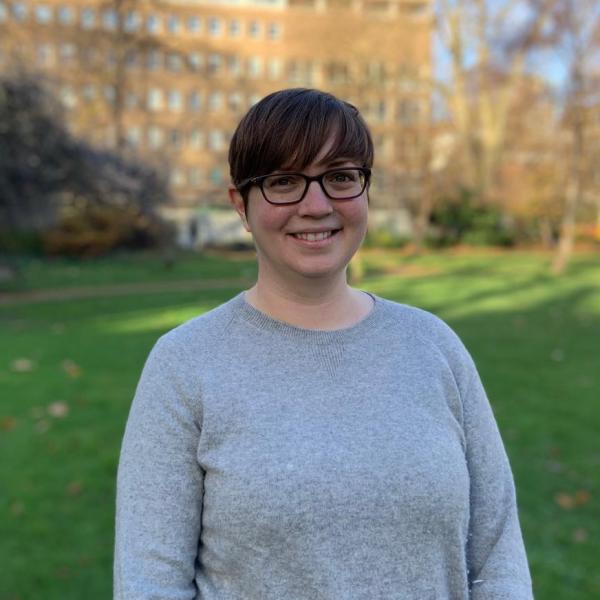Dr Helen Matthews
School of Biosciences
Research Fellow


+44 114 222 2310
Full contact details
School of Biosciences
B2-05
Florey Building
Western Bank
Sheffield
S10 2TN
- Profile
-
- 2021 – present Wellcome Trust/Royal Society Sir Henry Dale Fellow, University of Sheffield
- 2017 – 2021 Senior Research Associate, MRC Laboratory for Molecular Cell Biology & The Francis Crick Institute, London
- 2014 Visiting Scientist, Institut Curie, Paris
- 2009 – 2017 Postdoctoral Research Associate, MRC Laboratory for Molecular Cell Biology, London. Advisor: Buzz Baum
- 2004 – 2008 PhD University College London. Advisor: Roberto Mayor
- 2000 – 2004 MSci Imperial College London
- Research interests
-
Our research group is focussed on understanding how cells divide in normal tissues and during cancer development and metastasis. To do this we take a multidisciplinary approach, combining imaging and cell biology with biophysical techniques to measure mechanical forces associated with cell division.
Cell shape and mechanics during cell division
Cells go through a series of dynamic shape changes when they divide. These include cell rounding and stiffening in early mitosis and separation into two daughter cells at cytokinesis. We want to understand how these changes are co-ordinated by dynamic regulation of the actin cytoskeleton throughout cell division. We are particularly interested in how cells divide within epithelial tissues where they must maintain attachment with neighbouring cells to preserve tissue integrity and organisation.
Cell division in cancer
Cancer is a disease of uncontrolled cell proliferation and division. We are investigating how genetic mutations in cancer cells affect the cell division process. In recent work, we found that Ras oncogenes change cell shape and mechanics during mitosis (Matthews et al. 2020). We are now exploring how changes to cell division induced by the oncogenic kRas promote the formation of tumours during the early stages of pancreatic cancer development.
We are also interested in how the modified micro-environment within a tumour affects cancer cell division. Tumours are usually far stiffer than healthy tissue due to cell crowding and the deposition of extra-cellular matrix. We use micro-fabrication techniques to mimic some of the mechanical stresses (eg. compression, stretch) found in tumours to study how these conditions impact cell division.
- Publications
-
Journal articles
- Ras signalling at the actin cortex: Coordinating local and global changes to cell morphology. Current Opinion in Cell Biology, 97, 102600-102600.


- The cell-division cycle is faster in cell types prone to forming cancer. Nature, 641(8065), 1108-1109.


- Oncogenic Ras deregulates cell-substrate interactions during mitotic rounding and respreading to alter cell division orientation. Current Biology, 33(13), 2728-2741.e3.


- The role of RAS oncogenes in controlling epithelial mechanics. Trends in Cell Biology, 33(1), 60-69.


- Cell cycle control in cancer. Nature Reviews Molecular Cell Biology, 23(1), 74-88.


- Oncogenic RAS instructs morphological transformation of human epithelia via differential tissue mechanics. Science Advances, 7(42).


- Cell biology: How cancer cells coerce normal cells into tumorigenesis. Current Biology, 31(15), R957-R959.


- An asymmetric junctional mechanoresponse coordinates mitotic rounding with epithelial integrity. Journal of Cell Biology, 220(5).


- The mechanics of mitotic cell rounding. Frontiers in Cell and Developmental Biology, 8.


- Oncogenic Signaling Alters Cell Shape and Mechanics to Facilitate Cell Division under Confinement. Developmental Cell, 52(5), 563-573.e3.


- The Role of Mitotic Cell-Substrate Adhesion Re-modeling in Animal Cell Division. Developmental Cell, 45(1), 132-145.e3.


- Two-step interphase microtubule disassembly aids spindle morphogenesis. BMC Biology, 16.


- Exploring the Function of Cell Shape and Size during Mitosis. Developmental Cell, 29(2), 159-169.


- The metastatic cancer cell cortex: An adaptation to enhance robust cell division in novel environments?. BioEssays, 34(12), 1017-1020.


- Changes in Ect2 Localization Couple Actomyosin-Dependent Cell Shape Changes to Mitotic Progression. Developmental Cell, 23(2), 371-383.


- Directional cell migration in vivo. Cell Adhesion & Migration, 2(4), 240-242.


- Contact inhibition of locomotion in vivo controls neural crest directional migration. Nature, 456(7224), 957-961.


- Wnt11r is required for cranial neural crest migration. Developmental Dynamics, 237(11), 3404-3409.


- Directional migration of neural crest cells in vivo is regulated by Syndecan-4/Rac1 and non-canonical Wnt signaling/RhoA. Development, 135(10), 1771-1780.


Preprints
- Oncogenic Ras deregulates cell-substrate interactions during mitotic rounding and respreading to alter cell division orientation, Cold Spring Harbor Laboratory.


- Two-step interphase microtubule disassembly aids spindle morphogenesis, Cold Spring Harbor Laboratory.


- Ras signalling at the actin cortex: Coordinating local and global changes to cell morphology. Current Opinion in Cell Biology, 97, 102600-102600.
